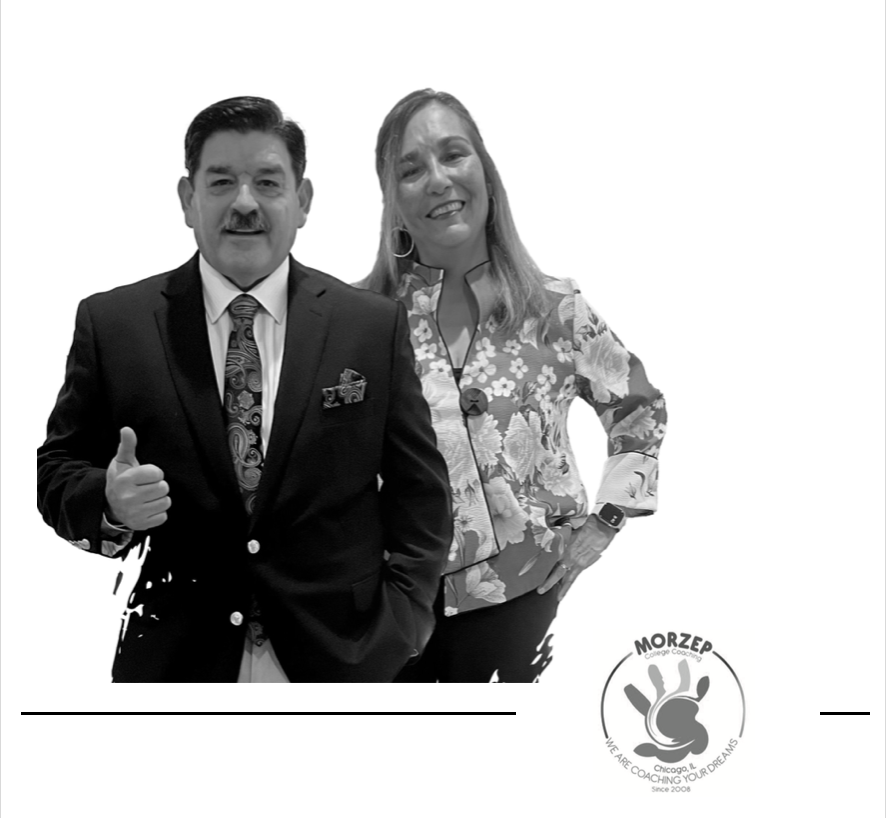By: Maria I. Zepeda and Mario E. Moreno
CEO/Co-founder and President
MORZEP COLLEGE COACHING
Education, Advocacy, Bias to Action, and Systemic Change
This spring, sitting comfortably at the State Farm Arena at the University of Illinois at Urbana-Champaign, impatiently listening to the names of nearly 800 students receiving their Engineering degrees, I was distracted while waiting to hear the name of our youngest daughter, who was occupying one of the chairs among the graduates.
My mind wandered to various topics until it stopped at a philosophical one, dense, difficult-to-handle, and even inappropriate thought for that moment because reason told me that it had to be all about her. For months, we had gone through deep introspection to define the WHY of our company. During the exercise, we discovered many things that clarified the reason for the existence of Morzep College Coaching – our company which we founded in Chicago in mid-2008 – where our life as individuals, as a family, and as a company was defined.
By this spring, my wife and I had already gone through several graduations of our own and those of our older children. Amid our little girl’s graduation, logic told me that I should focus on living in the moment and savoring the results of her efforts. Still, my mind resisted simplifying the moment because of my old habit of being unreasonable. So, inevitably, I plunged into my thoughts, trying to visit my past quickly. But why here? Why us? Why at this moment? WHY? WHY? WHY?
Without knowing it, since my early years, my life revolved around EDUCATION. It was never conscious; it was more like “it had to be this way.” It was an inherited obligation that ran in our family to get educated, excel, and grow. With that thought, early in my life, I began to define a vision of “constant improvement” that I did not fully understand. I tried to conquer unattainable goals for myself and my condition. Whenever I encountered a challenge, I rebelled, became unreasonable, and my hunger to overcome grew. I asked myself: Why were my goals impossible? Why would I not be able to do it? It was my dream, and I wanted to achieve it. I didn’t see why it was impossible. My immature mind resisted understanding my situation, not knowing what my desire implied.
I didn’t have a definite goal; I just wanted to replicate and surpass my parents’ inherited aspiration to achieve something “more” without knowing what “more” meant. With that mentality, I tried to study at the schools considered “the best.” Later, I realized that this notion of “the best” had more social overtones than factual ones. Nevertheless, I didn’t get into any of them. Still, I wanted to make my parents proud of my academic achievements, so I studied as hard as I could all through high school. I had no help beyond a pat on the back and a “Yes, you can do it!” but as I heard those words, my insides desperately screamed: “But I don’t know how to do it!”
My constant search for “the best” paid off when, in my second year of college, I got into what was considered one of the best universities in Mexico, which even my parents classified as financially unattainable. That’s how I saw it too, but something profound inside me refused to accept it as unreachable. Having a dream and then framing it as unachievable didn’t make sense. On the contrary, this impossibility made me want it even more and caused me to be irreverent, rebellious, and UNREASONABLE by most people’s standards.
My dream, although it seemed unreal, was cemented in my mind as something possible but without a defined path. Fortunately, my girlfriend at the time, who would later become my wife, seemed to share and resonate with many of the same dreams I had. She encouraged me to fight for my goals, and we visualized paths that seemed impossible. Her irrepressible drive and vivacity to see roads where there appeared to be none was the perfect fuel to keep the flame of hope very much alive. She inspired me and forced me to visualize the possibilities of achievement. But she didn’t know much either and had few resources to fall back on beyond believing in a shared dream. We soon became a team that overcame obstacles and broke down barriers. We also ran into insurmountable walls and impossible obstacles, but with each fall and each achievement, there was learning, many bumps and bruises, and much growth and maturation. The advantage of having someone to ADVOCATE for you, providing the needed support, became evident.
As a couple, we had a BIAS TO ACTION. “Let’s do it!” We constantly challenged each other, and when she said it was impossible, I refused to believe it, and vice versa. Action became our mantra, and without assessing risks or consequences, we sought new adventures. We didn’t settle for an opinion or a statistic. We constantly went to the source to verify whether the information we received was accurate. Regardless of the answer, we never used the information as an excuse to justify the impossibility of achieving what we wanted. Instead, we showed a fearless desire, although I must admit that on many occasions, we knew that our chances of attaining the goal were slim, but even then, we were inspired by the adventure and the satisfaction of having tried.
We learned to respect systems, but we were never intimidated by them. On the contrary, bureaucratic and inefficient systems inspired us to seek changes and alternative paths. We understood that, in many cases, the systems were more intimidating than practical. Unfortunately, the administrators of such systems quickly lost their compass and focused on keeping their rules safe instead of serving the interests of their users. For us, that was unacceptable. So, from the get-go, we decided not to be intimidated by the systems and the bureaucrats who administered them. More often than not, we felt like Quixotes fighting old windmills that remained undaunted by our onslaught. So we broke down walls, surmounted obstacles, and challenged the status quo by fighting for constant SYSTEMIC CHANGE.
Based on our past and history, and through a slow, tortuous, and sometimes painful process, we landed at the four pillars of Morzep College Coaching’s WHY: EDUCATION, ADVOCACY, BIAS TO ACTION, and SYSTEMIC CHANGE, which had been evident driving forces in our past, but that we, until now, hadn’t had the opportunity to describe it in words.
My daughter’s name on the PA system dispelled my thoughts. I jumped up and yelled at the top of my lungs for her accomplishments and then took multiple pictures of our beautiful little girl as she was getting her Engineering diploma. In my outburst, I was externalizing our history and life as we saw her epitomizing our WHY. A tear accompanied my euphoria as I sat down, blissful, savoring that experience and trying in vain to put words to my feelings.
This letter to us, although unorthodox, would make little sense to have started any other way. We had to trace the path we had walked of daily experience and daily actions from our beginning to make sense of it all. Our past, dreams, and passion had spoken loudly to us, but we refused to listen, obnubilated by the deafening social cacophony that often pointed out why we should not aim to achieve our dreams. The temptation to follow the masses like sheep, sacrificing our aspirations and playing along to fit in with a society that cares little for anyone, was huge. In a deliberate act of rebellion, we decided not to conform, thus triggering many plans and projects far from the norm.
Regarding the business aspect of our lives, we believe that we should have started our own company at least twenty years before we did it. But, of course, there will be those who say we started too late and those who think we did it just at the right time. Today, what other people think is irrelevant. What is very relevant is the learning we got out of our experiences. Would we go back in time if we could? Probably yes, but not at the cost of relearning all the lessons we learned through the years. So, a more appropriate answer is: No! We would not go back in time; after all, our experience and growth through painful lessons were well worth it, and all those experiences helped us to clarify our purpose in life.
Fortunately, we learned how to learn a long time ago. Earlier, we wanted so many things, but we failed to work in a focused way toward those desires. We learned many topics and skills, but we never put them into practice. The most unfortunate thing was that we didn’t share our knowledge with others. We learned that what is presented as “good for you” might not be that “good for you.” So, we learned to WORK for our desires, to PRACTICE our skills, and to SHARE our knowledge; with that, we became happier than ever.
In our early days, and even as adults, we got used to the education system and society prescribing what they thought we needed, and it felt great to conform and travel the well-traveled path that involved opening our mouths and feeding on pre-existing knowledge and behavior, under the precept that everything “was for our good.” Yet, even that experience enhanced our lives and helped us clarify our reason for being here today.
Through the four pillars that define Morzep College Coaching’s WHY, extracted from our origins, we can see the past and understand how we evolve into the present as we react toward an unsure future. During our unique journeys, we obtained invaluable life lessons that we wanted to share with you in the hope that they will help you in your future endeavors. This is the MORZEP’s WHY decalogue:
- Don’t ignore who you are, what makes you tick, or what activity makes you lose track of time because therein lies the key to your success.
- Identify how you learn, and please, take advantage of it.
- Find those activities, teachers, professors, mentors, and friends that encourage your creativity.
- Desire to achieve your dreams and conquer your goals, however impossible they may seem, but go beyond the desire; work for it.
- Consistently implement the skills and knowledge learned; practice them so they do not become inert knowledge.
- Whatever you know, share it; there is no better way to learn something than by teaching it.
- Don’t wait. Start early. If you fail, you will have time to try again many times.
- Continually educate yourself, constantly seek support, take action, and break the status quo through systemic change; the results will be evident and tangible.
- Please, always be unreasonable! We do not believe that there is a truly successful entrepreneur who hasn’t been unreasonable, and
- Be happy!
MUCH SUCCESS IN YOUR SEARCH FOR HAPPINESS.




